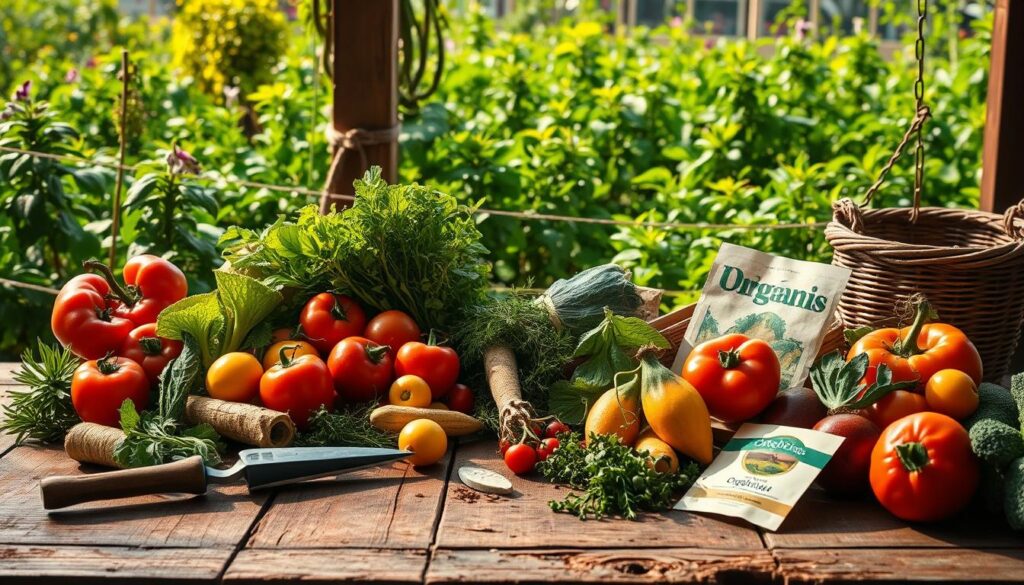Organic gardening is more than a passing trend. It’s a full-on approach that uses natural methods to grow plants. It puts the health of our entire ecosystem first. By saying no to synthetic products, you make your garden a haven for soil, plants, and helpful bugs. This piece shares key advice for making your garden not just survive but thrive, doing good for the environment and your health. Adopt these eco-friendly ways to turn your garden into an organic oasis.
Introduction to Organic Gardening
Organic gardening is all about sustainability and working in harmony with nature. It follows the USDA’s National Organic Standards. These rules focus on using natural materials and methods. Gardeners learn to work closely with nature, helping to keep the ecosystem balanced and full of life.
Anúncios
To build a thriving garden, understanding organic gardening principles is key. This means keeping the soil healthy, using local and organic seeds, and encouraging many different types of plants and animals. As people learn about the environment’s needs, many switch to organic gardening. They want healthier plants and safer food.

Anúncios
If you’re new to this, a starter guide to organic gardening can really help. It walks you through the basics, like what tools to use and how to care for your garden. Remember, being a successful organic gardener means committing to take care of the Earth every step of the way.
Benefits of Organic Gardening
Organic gardening offers a wealth of benefits, attracting many people. It creates a safer space for people, pets, and wildlife by not using harmful chemicals. This approach lessens environmental harm. It helps maintain healthy ecosystems, preserving our planet for the future.
Eating homegrown produce means fewer pesticides and more nutrients. This leads to healthier meals. Organic fruits and veggies are a tasty, nutrient-packed option. Gardening also improves physical and mental health through outdoor activity.
Organic gardening supports sustainable methods like composting and rotating crops. These practices improve soil health, plant growth, and save water. Using fewer synthetic products can also lower water bills. So, gardeners save money while enjoying their own produce.
Site Selection for Your Organic Garden
Choosing the right spot is key to a successful organic garden. Look for places with enough sunlight, as most veggies and herbs need around six hours of sun a day. Too little light can make your plants weak and lower your harvest.
The soil’s health matters a lot for your plants. Think about soil drainage and how fertile it is. Stay away from spots where water stands, to avoid root diseases. A soil test can tell you what your soil is missing, helping you make it perfect for planting.
Having water close by is important. It makes watering easier and helps your plants stay hydrated. Also, check nearby areas for pesticide use that could harm your organic garden.
Understanding Soil Health in Organic Gardening
Soil is pivotal for a thriving garden. It’s like a bustling city for plants, with all essentials for growth. Understanding what makes soil healthy helps gardeners make smart choices.
Importance of Soil Composition
Soil is made up of organic matter, tiny life forms, and it needs good structure. This mix ensures water and air move well. It makes soil better by:
- Boosting plant nutrients
- Enhancing water hold and flow
- Attracting helpful soil animals
Gardeners learn to work with sandy, clay, or silty soils. Knowing these helps in picking the right soil fixers. This way, all plants get what they need to grow strong.
How to Amend Soils Naturally
Boosting soil with organic stuff is key. People do this by:
- Adding compost to up nutrients
- Mixing in old manure for more organic matter
- Planting cover crops to better soil structure
By doing these, gardeners boost soil health. This leads to lush organic gardens.
Essential Nutrients for Healthy Plants
To grow healthy plants organically, it’s important to know about their nutrients. They need several main nutrients, such as nitrogen, phosphorus, and potassium. They also need other minor nutrients. The right fertilization boosts growth and helps plants produce more.
Organic Fertilizers
Organic fertilizers are great natural alternatives. They give plants important nutrients from natural sources. There are mainly two kinds: ones from plants and ones from animals. Examples are compost, dried manure, and fish emulsion.
Compost makes the soil better and healthy. It gives nutrients slowly to support plants longer. Fish emulsion is a liquid fertilizer that works fast. Testing the soil helps gardeners fix any missing nutrients. Using organic fertilizers helps make a garden full of life.
Watering Techniques for Organic Gardens
Watering is key for healthy plants in organic gardens. It’s crucial to set up a steady water supply. This keeps the soil moist. There are many ways to water plants properly.
Drip irrigation is a top choice. It sends water right to the roots, cutting down on evaporation. Soaker hoses are great too. They let water slowly soak into the ground. For small gardens or tender plants, watering by hand is best. It lets gardeners control water use.
Checking soil moisture often is important. Change how much you water based on the weather and rain. Using mulches helps keep the soil moist. It lowers how often you need to water.
Effective Pest Management in Organic Gardening
Organic pest control focuses on stopping infestations before they start. Choosing plants that pests don’t like can help a lot. Keeping your plants healthy also makes them stronger against pests.
Natural ways to manage pests work well. Bringing in good bugs, like ladybugs and lacewings, helps balance your garden. Using barriers, such as nets, keeps pests away but lets in sunlight and rain.
Organic options like insecticidal soap and garlic sprays also fight off pests. These choices are safe for the environment. By using these methods, your garden stays healthy and organic.
Choosing Organic Seeds and Plants
Beginning an organic garden starts with choosing the right seeds and plants. Organic seeds are important because they’re grown without harmful chemicals. Make sure to pick seeds marked as “Certified Organic.” This ensures they meet strict USDA standards for sustainable farming.
Although it might be hard to find organic seeds in some places, local seed catalogs and nurseries often have a variety. When choosing plants, here’s what to remember:
- Research local varieties: Some plants do better in certain climates. Look for organic seeds that grow well where you live.
- Prioritize organic seeds: If you can’t find organic, untreated conventional seeds are the next best thing.
- Consider plant needs: Know the needs of the plants you choose. This helps your organic garden thrive.
Choosing the right plants for your organic garden helps create a healthy garden. It also leads to more gardening success.
Crop Rotation and Its Benefits
Crop rotation is vital for sustainable gardening. By changing crops each season, this stops nutrient loss and cuts down on pests. It makes the soil healthier and plants stronger over time.
The benefits of crop rotation are clear:
- It boosts soil fertility by swapping crops that use lots of nutrients with those that add nitrogen back.
- It stops diseases and pests from getting settled by mixing up their environment.
- It makes plants healthier, which means they produce more.
Using crop rotation is key for gardening that’s good for the planet. It helps keep nature diverse, fights pests without chemicals, and follows organic farming rules. This practice isn’t just about growing food now—it helps keep our earth balanced for the future.
Companion Planting Strategies for Better Yields
Companion planting boosts crop yields by using garden plant friendships. This method makes plants help each other grow and fight pests. For example, marigolds keep bad insects away, and beans make the soil better for plants. By choosing plants that get along, gardeners can make their gardens thrive.
Here are some top companion planting tips to improve your garden:
- Combine flowering plants with vegetables to attract pollinators.
- Plant herbs like basil or dill near tomatoes to repel pests.
- Use tall plants, such as corn, to provide support for climbing crops like beans.
- Group crops that share similar water and nutrient requirements for optimum growth.
Learning about companion planting can make gardens healthier and manage pests naturally. This way of gardening cuts down on chemicals, making it better for the planet.
Conclusion
Organic gardening’s rules lead to healthier gardening that is good for us and the planet. By using organic methods, gardeners grow healthy food. They also help keep our ecosystems strong, improving soil and biodiversity.
Every part of organic gardening, like keeping soil healthy, managing pests, and rotating crops, is key. These methods help gardens and nature work well together. This makes a place where plants grow strong without artificial stuff.
Organic gardening is more than just growing plants. It’s about taking care of the Earth. When people garden this way, they help the environment. This will make a better world for the next generations.
FAQ
What defines organic gardening?
What are the benefits of organic gardening?
How do I select the best site for my organic garden?
Why is soil health important in organic gardening?
How can I amend my soil naturally?
What types of nutrients do organic plants need?
How should I water my organic garden?
What is organic pest management?
How do I choose organic seeds?
What is crop rotation and why is it important?
What is companion planting?
Content created with the help of Artificial Intelligence.



